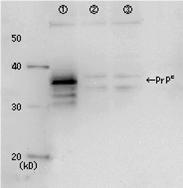Description
Prion protein PrP is a membrane glycosylphosphatidylinositol (GPI) anchored glycoprotein highly expressed in neuron and glia cells as well as immune and reproductive cells. Mutations in the octapeptide repeat regions as well as elsewhere in this gene have been associated with neurodegenerative diseases such as Creutzfeldt Jakob disease, fatal familial insomnia, Gerstmann Straussler disease, Huntington disease like 1, and kuru. The infectious isoform of PrPC, known as PrPSc, is able to convert normal PrPC proteins into the infectious isoform, which is insoluble amyloid aggregate, by changing their conformation (1). Mature PrP protein in human consists of 209 amino acids. Several topological forms exist; one cell surface form anchored via glycolipid and two transmembrane forms, therefore multiple bands are observed in SDS-PAGE (Figure 1 below).
Applications
1) Western blot (~0.5 μg/ml)
2) ELISA (most suitable)
Other applications have not been tested.

Figure 1. Identification of Prion protein in crude cell extract by Western blot using the monoclonal antibody 2C5-5. Lane 1: Extract of rabbit kidney cells RK13 over-expressing prion protein; Lane 2: Negative control; extract of the vector infected cells; Lane 3: Negative control; extract of RK13 cells
Specification
Immunogen: Recombinant human PrP lacking GPI anchor expressed and purified from rabbit kidney cell line RK13
Reactivity: Reacts with human Prion but not with mouse Prion. Other species have not been tested.
Antibody type: Mouse monoclonal antibody, IgG1 (kappa). The hybridoma clone 2C5-5 was established in the laboratory of Prof. K. Ikuta at Osaka University.
Form: Purified IgG 1 mg/ml in PBS (-), 50% glycerol, filter-sterilized (azide-free)
Storage: ship 4°C and store at -20°C or long term storage -80°C
Data Link UniProtKB/Swiss-Prot P04156 (PRIO_HUMAN)
References


Reviews
There are no reviews yet.